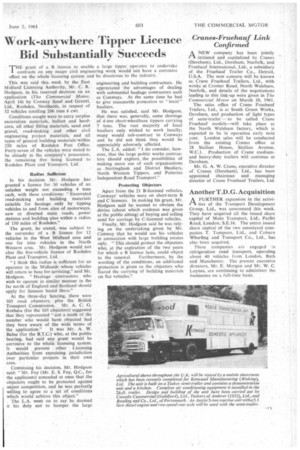Work-anywhere Tipper Licence Bid Substantially Succeeds
Page 47

If you've noticed an error in this article please click here to report it so we can fix it.
THE grant of a B licence to enable a large tipper operator to undertake contracts on any major civil engineering work would not have a corrosive effect on the whole licensing system and be disastrous to the industry. '
This was said this week by the East Midland Licensing Authority, Mr. C. R. Hodgson, in his reserved decision on an application (The Commercial Motor, April 14) by Conway Sand and Gravel, Ltd., Rushden, Northants, in respeot of 52 vehicles totalling 206 tons 6 cwt.
Conditions sought were to carry surplus excavation materials, ballast and hardcore, all other .filling materials, sand and gravel, road-making and other civil engineering project materials, and all types of general building materials-within 250 miles of Rushden Post Office. Forty-seven of the vehicles were stated to be already in the company's possession, the remaining five being licensed to Rushden Plant and Transport, Ltd.
Radius Sufficient In his decision Mr. Hodgson has granted a licence for 30 vehicles of an unladen weight not exceeding 4 tons each, with these conditions: "Excavated road-making and building materials suitable for haulage only by tipping vehicles to and from sites of motorways, new or diverted main roads, power stations and building sites within a radius of 150 miles of Rushden."
The grant, he stated, was subject to the surrender of a B licence for 12 vehicles in the West Midland area and one for nine vehicles in the North Western area. Mr. Hodgson would not alter the five-vehicle licence of Rushden Hark and Transport, Ltd.
"I think • this radius is sufficient for an operator in the Midlands whose vehicles will return to base for servicing," said Mr. Hodgson. "Haulage contractors who wish to operate in similar manner in the far north of England and Scotland should apply for licences based there."
At the throe-day hearing, there were 105 road objectors, plus the British Transport Commission. Mr. A. C. G. Rothera (for the 105 objectors) suggested that they represented " not a tenth of the number who would have objected had they been aware of the wide terms of the application." It was Mr. A. W. Balne (for the B.T.C.) who, at the public hearing, had said any grant would be corrosive to the whole licensing system. It would prevent other Licensing Authorities from exercising jurisdiction over particular projects in their own area.
Continuing his decision, Mr. Hodgson said: "Mr. Fay (Mr. E. S. Fay, Q.C., for the applicants) conceded at once that the objectors ought to be protected against unjust competition, and he was perfectly willing to agree to a set of conditions which would achieve this object."
The L.A. went on to say he deemed it his duty not to hamper the large engineering and building contractors. He appreciated the advantages of dealing with substantial haulage contractors such as Conways. At the same time he had 40 give reasonable protection to " local " hauliers.
He was satisfied, said Mr. Hodgson, that there was, generally, some shortage of 4-ton short-wheelbase tippers carrying 7 tons. The vast majority of local hauliers only wished to work locally; many would sub-contract to Conways and he did not think they would be appreciably adversely affected.
The L.A. added: "I do consider, however, that the large public works contractors should explore_ the possibilities of making more use of such organizations as Nottingham and District Hauliers, North Western Tippers, and Potteries Independent Road Transport."
Protecting Objectors Apart from the 21 B-licensed vehicles, Conways' vehicles were on short-term B and C licences. In making his grant, Mr. Hodgson said he wanted to obviate the device (about which evidence was given at the public sitting) of buying and selling sand for carriage by C-licensed vehicles.
Finally, Mr. Hodgson said he was relying on the undertaking given by Mr. Conway that he would use his vehicles in connection with large building estates oply. "This should protect the objectors who, at the expiration of the two years for which a B licence lasts, could object to the renewal. Furthermore, by the wording of the conditions, an additional protection is given to the objectors who reared the carrying of building materials on flat vehicles.'!
Cranes-Fruehauf Link Confirmed
I-1 A NEW company has been jointly
initiated and capitalized by Cranes (Dereham), Ltd., Dereham, Norfolk, and Fruehauf international, Ltd., a subsidiary of the Fruehauf Trailer Co., Detroit, U.S.A. The new concern will be known as Crane Fruehauf Trailers, Ltd., with works at Cromer Road, North Walsham, Norfolk, and details of the negotiations leading to this link-up were given in The Commercial Motor on March 10, 1961.
The sales office of Crane Fruehauf Trailers, Ltd., is at South Green Works, Dereham, and production of light types of semi-trailer — to be called Crane Fruehauf models—will take place at the North Walsham factory, which is expected to be in operation early next year. London sales will be conducted from the existing Cranes office at 28 Sicilian House, Sicilian Avenue. W.C.I. Production of Crane mediumand heavy-duty trailers will continue at Dereham.
Mr. G. A. W. Crane, executive director of Cranes (Dereham), Ltd., has been appointed chairman and managing director of Crane Fruehauf Trailers, Ltd.
Another T.D.G. Acquisition
r%
A FURTHER expansion in the activi
ties of the Transport Development Group, Ltd., was announced this week. They have acquired all the issued share capital of Mob o Transport, Ltd., Parfitt Road, London, S.E.16. The entire issued share capital of the two associated companies T. Tompson, Ltd., and Coburn Wharfing and Transport Co., Ltd., has also been acquired.
These companies are engaged in refrigeration road transport, operating about 40 vehicles from London, Bath and Manchester. The present executive directors, Mr. E. Morgan and Mr. W. C. Loynes, are continuing to administer the businesses on a full-time basis.
















































































































































































